#robert i d'artois
Text
Loyal brothers
The Capetian kings found their brothers no more difficult than their sons. The exceptions were the brothers of Henri I, Robert and Eudes, but thereafter the younger Capetians developed a tradition of loyalty to their elders. Robert of Dreux, the brother of Louis VII, who was the focus of a feudal revolt in 1149, was only a partial exception, for at that date the king was still in the East, and the real object of the hostility was the regent Suger. By contrast, Hugh of Vermandois was described by contemporaries as the coadjutor of his brother, Philip I. St Louis's brothers, Robert of Artois, Alphonse of Poitiers, and Charles of Anjou, never caused him any difficulties, and the same can be said of Peter of Alençon and Robert of Clermont in the reign of their brother Philip III. Even the disturbing Charles of Valois, with his designs on the crowns of Aragon and Constantinople, was always a faithful servant to his brother Philip the Fair, and to the latter's sons. The declaration which he made when on the point of invading Italy in the service of the Pope is revealing:
"As we propose to go to the aid of the Church of Rome and of our dear lord, the mighty prince Charles, by the grace of God King of Sicily, be it known to all men that, as soon as the necessities of the same Church and King shall be, with God's help, in such state that we may with safety leave them, we shall then return to our most dear lord and brother Philip, by the grace of God King of France, should he have need of us. And we promise loyally and in all good faith that we shall not undertake any expedition to Constantinople, unless it be at the desire and with the advice of our dear lord and brother. And should it happen that our dear lord and brother should go to war, or that he should have need of us for the service of his kingdom, we promise that we shall came to him, at his command, as speedily as may be possible, and in all fitting state, to do his will. In witness of which we have given these letters under our seal. Written at Saint-Ouen lès Saint-Denis, in the year of Grace one thousand and three hundred, on the Wednesday after Candlemas."
This absence of such sombre family tragedies as Shakespeare immortalised had a real importance. In a society always prone to anarchy the monarchy stood for a principle of order, even whilst its material and moral resources were still only slowly developing. Respectability and order in the royal family were prerequisites, if the dynasty was to establish itself securely.
Robert Fawtier - The Capetian Kings of France
#xii#xiii#xiv#robert fawtier#the capetian kings of france#henri i#robert i de bourgogne#louis vii#robert i de dreux#abbé suger#philippe i#hugues de vermandois#louis ix#robert i d'artois#alphonse de poitiers#charles i d'anjou#philippe iii#pierre d'alençon#robert de clermont#philippe iv#charles de valois
7 notes
·
View notes
Text
This theory has been on my mind for a year but what if artoirel's name was directly inspired from the comté d'artois (county in the top north of france) and counts robert I and robert II of artois, son and cousin of kings. Gravitating around power like the fortemps family does with aymeric
3 notes
·
View notes
Photo
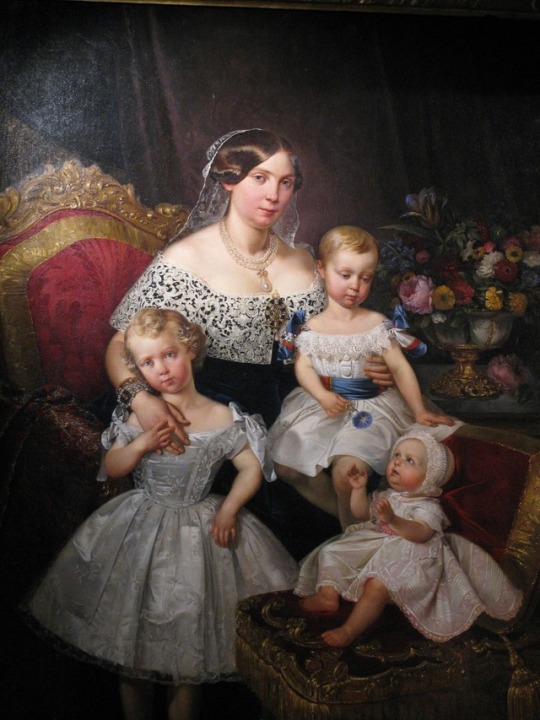
Louise Marie Thérèse d'Artois, Duchess of Parma with her three eldest children, Margherita, Robert, and Alice. The portrait was done in 1849 by Raffi Prosper.
Her fourth and youngest child, Enrico, would be born two years later.
#louise marie therese d'artois#duchess of parma#robert i#Margherita of Bourbon-Parma#Alice of Bourbon-Parma#raffi prosper#long live the queue
86 notes
·
View notes
Text
I found very nice illustrations for Maurice Druon's book cycle Les Rois Maudits (English: The Cursed Kings). The artist's name is Celine Pottier.
Я нашла очень славные иллюстрации к циклу романов Мориса Дрюона "Проклятые короли". Художницу зовут Селин Поттье.
#Les Rois Maudits#Les Rois Maudits art#Les Rois Maudits illustration#Maurice Druon#Проклятые короли#Проклятые короли иллюстрация#Морис Дрюон#Проклятые короли арт
1 note
·
View note
Photo

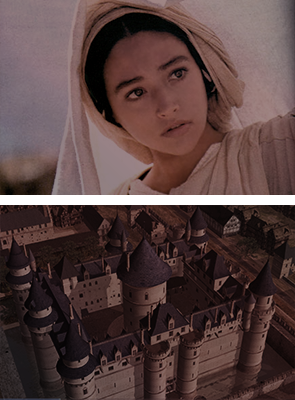
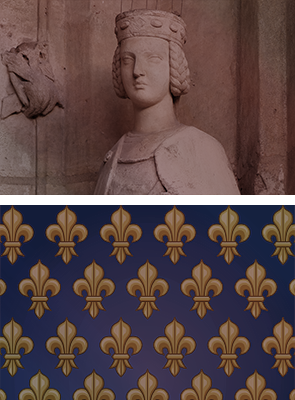
WOMEN’S HISTORY † SAINT ISABELLE DE FRANCE (March 1224 – 23 February 1270)
Saint Isabelle de France was the only surviving daughter of Louis VIII de France and Blanca de Castilla. Her brothers were Saint Louis IX, Robert d'Artois, Alphonse de Poitiers, and Charles I of Naples and Sicily. Her father died in 1226 and thus, Isabelle and her brothers were primarily raised by their intelligent and deeply devout mother. The fact that all of Isabelle's brothers all had no illegitimate children is often attributed to their mother's influence.
In 1230, Isabelle was betrothed to Hugues XI de Lusignan, son of Hugues X de Lusignan and Isabelle d’Angoulême, but the marriage was never celebrated because Isabelle refused to consent to the marriage. Later on, Isabelle also refused the hand of Konrad IV, Herzog von Schwaben (son of Holy Roman Emperor Friedrich II and Isabelle II de Jérusalem) and declared that she intended to remain a virgin throughout her life.
In 1255, Isabelle declared that she wished to a found a monastery of Poor Clares and her brother, Louis, acquired the land in the forêt de Rouvray. The monastery was built between 1256 and 1259. Afterwards, Isabelle took up residence in the convent, though she never took the formal vows to become a nun. She died 23 February 1270, six months before Louis perished on the Eighth Crusade. After their deaths, their younger brother, Charles, testified to the Pope about their piety and sanctity. Louis was finally canonized in 1297 and Isabelle in 1696.
#isabella of france#house of capet#french history#european history#women's history#history#medieval#women's history graphics#nanshe's graphics
250 notes
·
View notes
Text
Bringing up a young prince
In thirteenth-century France, royal children were often on the move, travelling from manor to manor, usually within the Ile de France. Much later in his life, Charles was to record the powerful influence of his mother on the upbringing of all her sons and daughters. Joinville's life of St Louis reveals her to us as pious, forceful and competent. She lent her strength of purpose to her sons, perhaps particularly to her youngest. But she will have been much occupied in the years of Charles's infancy with matters of state. He and his sister Isabelle, who was two years older than him, probably did not see her very frequently. They were looked after by nurses, in the charge of a trusted knight.
Manuals concerned with the upbringing of aristocratic boys usually cited seven as the appropriate age for a boy to leave the care of women and take his place in a male environment. In practise, the age varied: in the case of a child with no father, it is likely to have been rather later. But at some time around 1234 or 1235, Charles will have been put into the care of one of his brothers. There was a gap of seven years between Charles and Alphonse, his nearest male sibling, eleven years divided Charles from Robert, and thirteen from his illustrious brother Louis. When first heard of in the records of 1237, Charles was at Robert's court; by 1241 he had moved to that of Alphonse, to whom he was to be close until the latter's death in 1271. At what point it was decided that he was not to follow his father's wishes and enter the Church cannot be determined. It must, however, have been before 1242, when he went with his brothers on a campaign against the count of La Marche, the ally of Henry III, king of England and claimant to the lands once held by King John in France.
We know nothing of the education enjoyed by the young prince; but whoever was responsible for introducing him to the military arts will have found a pupil of great potential. Charles was to be a notable warrior. He was also well grounded in grammar and rhetoric; in adulthood he wrote love poems in French which he set to music, and was sufficiently competent in Latin to be critical of others' performances. His intellectual training showed in the uncommon interest he later took in medical science and in law. Like all his brothers, he was brought up in a deeply Christian environment, and taught to understand the doctrines of his faith in so far as it was appropriate for a layman. The resources of the Paris area were clearly well up to the task of equipping a young prince in all the skills on which he was later to draw.
Charles's young mentors Robert and Alphonse were facing a challenge: how to deal with their great apanages, for which there were no precedents. Louis VIII's will of June 1225 had established his sons Robert, John and Alphonse as princes. Robert was, when adult, to receive Artois, the county that had been his mother's dowry, John was to have Anjou and Maine, and Alphonse the county of Poitou, all three counties recently taken from King John. Jean Richard has argued that Louis's motives in making such liberal allowance for two of his younger sons within the lands conquered from King John was to ensure that there was a Capetian around whom local loyalties would focus, in order to wipe out memories of Angevin rule in the area. In addition, the king will have faced the usual dilemna of how to protect the inheritance rights of his eldest son while also providing his other offspring with lands suitable to their standings. His solution- similar to that invented by the Angevin Henry II- was possible only for those who had recently made substantial acquisitions of land and wealth.
King Louis's brothers, therefore, found themselves created the equals of the five great feudatories of France, the counts of Flanders and Champagne, and the dukes of Aquitaine, Burgundy and Brittany. Robert acquired Artois in 1237, Alphonse Poitou in 1241. In tackling their responsibilities they were assisted by men trained in the royal court, and encouraged to imitate the methods of government developed in Paris. Artois and Poitou, though not absorbed within the royal demesne, were governed in very similar ways.
Jean Dunbabin- Charles I of Anjou- Power, Kingship and State-Making in Thirteenth-Century Europe-
#xiii#jean dunbabin#charles i of anjou: power kingship and state-making#charles i d'anjou#brothers#blanche de castille#louis ix#robert i d'artois#alphonse de poitiers#isabelle de france
7 notes
·
View notes
Text
Charles of Anjou and his brothers.
King Louis had been notably generous. Perhaps the decision that Charles should become count of Anjou had been made before the chance of the marriage arose, and Louis thought it inexpedient to change his mind once his brother had acquired Provence. On the other hand, the king may have anticipated positive benefits to the kingdom from his gift. The energetic young Charles might be counted on to oppose any attempt at reconquest by the English, and to undermine any surviving Breton influence in the area. Besides, Louis clearly did not regard his brothrs as potential rivals; if he had done so, he would not have encouraged Alphonse to expand beyond his core county of Poitou to take the Limousin under his authority; nor would he have planned Alphonse's marriage to the daughter of the count of Toulouse, a marriage which in 1249 brought him the huge county of Toulouse and part of the old marquisate of Provence to add to his already substantial holdings. In this case Louis must have been confident that he could exercise his authority over his sibling when need be. The same was probably true for Charles, whose lands within France were far smaller than Alphonse's.
Nevertheless, the enfeoffment of 1246 was a substantial endowment at the expense of the royal demesne [...]
From the end of 1246, therefore, Charles had the resources and position to begin to make his mark on western Europe by demanding the recognition of his rights, real or pretended, in every sphere. Although he continued to feel grateful to Louis for his vital assistance to his career, there was frequently an element of tension in his relations with his eldest surviving brother. Louis's position marked him out as one who must be obeyed; Charles by temperament was one to whom obedience came hard. Louis sometimes complained of Charles's insensitivity. Joinville painted a vivid picture of the king's sudden fury on discovering, as he sailed away defeated from Egypt in 1250 and in mourning for the death of his brother Robert, that Charles, far from attempting to comfort him, was playing dice with a friend. Given the temperamental differences between them, occasional signs of strain after 1246 were only to be expected.
Yet historians have been prone to exaggerate them. It is alleged that Louis forced Charles to surrender the county of Hainault, which Marguerite, countess of Flanders, had conferred on him in 1253. Louis is usually portrayed as reluctant to endorse the papal plan of sending Charles to conquer Sicily, while Charles is seen as desperate to get his hands on that rich realm. Neither picture is clearly supported by the evidence.
[...]
The most potent sources of friction were those that Charles inherited from his father-in-law Raymond Berengar V of Provence. The claimed monopoly on the salt trade up the Rhône deeply aggravated Louis, as did Charles's failure to pay up in full Margaret of Provence's dowry [...]
Though Louis did not particularly like Charles, he trusted him. He coupled him with Alphonse as regent of the realm when Blanche of Castille died in 1252. He entrusted them both with tricky negotiations with Henry III and Innocent IV in 1251. In arbitrating between Charles and his mother-in-law Beatrice of Savoy in 1256, the king substantially enhanced his brother's political power in Provence by obtaining for him the county of Forcalquier, in return for a pension to Beatrice which Louis himself paid. He seems to have prevented his wife Margaret, Beatrice's daughter, from causing trouble to his brother in Provence. He intervened in Anjou to acquire for Charles a castle that the younger man regarded as crucial to his power. These were not the actions of a saintly king who disapproved of his headstrong younger brother's conduct; nor were they acts of mere indulgence.
It is clear that Charles benefited substantially in the eyes of outsiders from his close relationship with Louis. His opponents in Provence and Italy feared possible French intervention in his support, and were therefore on occasion moved to treat with him rather than continuing the fight. [...] Louis IX's favour was worth having, and those who helped Charles expected to win it. This expectation argues against the tensions between the two brothers from being significant.
[...]
More striking was Charles's consistent friendship with Alphonse. For much of Louis's reign, the brothers worked together. It is true that there was the occasional spat of irritation between them when Alphonse's acquisition of the county of Toulouse made him Charles's neighbour in Provence; Charles was deeply hurt that Alphonse would not in 1264-65 commute his vow to go again to the Holy Land into service in the conquest of the Regno. But for the most part their interests were compatible. Together they subjected Avignon and the old marquisate of Provence to Capetian interests. Together they strengthened their holds on their respective domains by refusing to shelter each other's rebels. Together they pursued claims against Louis to the inheritance of the countess of Boulogne and the count of Clermont. When Alphonse fell ill in the Regno on his way back from the Tunis crusade, Charles demanded that the best medical help available in Naples be sent at once to him. His brother's death in 1271 must have come as a bitter blow.
None of his other male relations came near to equalling Alphonse's influence. But throughout his life, Charles looked to his nephews and cousins for backing and positive military support. His son-in-law Robert de Béthune was a pillar of his government in the Regno during the early years, his nephews Robert d'Artois and Pierre d'Alençon rushed to his assistance in 1282-83. He remained a family man until death, and a man who took great pride in his closest kin.
This characteristic is perhaps most evident in his testimony, probably in 1282, to a papal enquiry into the canonization of Louis. Charles talked of his family as the holy root from which sprang saintly branches; he argued that both Robert (who died on crusade) and Alphonse (who aspired to meet such a death) were as worthy as Louis of being elevated to the status of martyrs for the faith. For him, sanctity was a family trait, enhanced in his generation by excellent upbringing. Obviously this testimony was far from disinterested. But his slant on his eldest brother's claim to be canonized is noteworthy. After all, as a crowned head himself, Charles might have made more of Louis as God's representative on earth, or of the royal anointing as a kind of sacrament. He ignored the opportunity to contribute to the cult of kings, in favour of an encomium on the Capetians.
Jean Dunbabin- Charles I of Anjou- Power, Kingship and State-Making in Thirteenth-Century Europe.
#xiii#jean dunbabin#charles i of anjou: power kingship and state-making#charles i d'anjou#louis ix#alphonse de poitiers#robert i d'artois#marguerite de provence#béatrice de savoie#robert de béthune#pierre d'alençon#brothers#family feelings
2 notes
·
View notes
Text
@joachimnapoleon asked me: 19 & 26 :)
Hi! :) Thanks for asking.
19 - What's your favourite historical book ?
What do you mean by historical book ?
If it's biographies, or actual historians' works, I have barely started with most of them. I did enjoy H.Cole's "The Betrayers" a lot, so thanks for telling me about it. It raised interesting questions, and though it was sometimes difficult (emotionally) to read, I have learned a lot. It's a good book to have if you're interested in Murat, Napoleon, and specifically Napoleon's relationships with the people who were close to him. I'm also enjoying, right now, J.C. Petitfils' bio of Louis XIII - I may talk more about it later.
For "historical fiction", I love M.Druon's "Accursed Kings" saga (Les Rois Maudits, in French). It's a novellisation of the start of the Hundred Years War, through the actions and motivations of a high lord of France, Robert d'Artois; it starts at the end of the reign of Philippe IV and goes to the reign of Philippe VI. It's a vision of the early XIVth century which seems to surge under our eyes, with its passions and hatreds, its sounds and colors, rivalries and tragedies (the Templars' Curse!)
And of course, although it plays fast and loose with History, Dumas' "Les Trois Mousquetaires" is still a staple of my childhood. You can read it with a critical eye and still enjoy the tale of friendship and adventure - plus, it's an era I can't really be indifferent to (it's the musketeers! La Rochelle! the duels! Richelieu! :) )
I hope I will be able to answer much more seriously next year :)
26 - Who do you think is a forgotten hero we should know about and admire ?
That's the moment I typically answer "Larrey!" But in our little circle we all know about and admire him :) Right now too many names are echoing in my mind. So Larrey it is, because giving your time and energy, your skill and passion, to heal and comfort others, is always worthy of admiration. I hope I didn't fail too badly! :))
12 notes
·
View notes
Photo


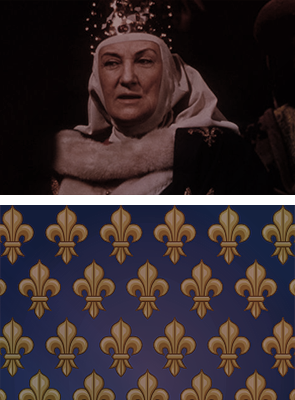

WOMEN’S HISTORY † MAHAUT d’ARTOIS (1268 – 1329)
Mahaut d'Artois was the eldest child and only daughter of Robert II, comte d'Artois and Amicie de Courtenay. In 1291, she married Othon IV, comte de Bourgogne, by whom she had a son and two daughters. On 11 September 1298, her younger brother, Philippe, died of wounds he’d received at the Battle of Furnes. Philippe had six children–five daughters and a son–but all of them were children and thus, it was considered inappropriate for any of them to inherit the important county of Artois. Thus, Mahaut was made the comtesse d'Artois on the grounds of proximity of blood. She was an able ruler and constantly defeated attempted rebellions by her vassals. When he came of age, her nephew, Robert III, challenged her claim to the county, but was constantly overruled.
In 1303, Othon died of wounds he’d received during the Battle of the Golden Spurs and Mahaut served as regent for her young son, Robert. The ambitious Mahaut then arranged for her two young daughters, Jehanne and Blanche, to marry sons of Philippe IV de France and Jehanne Ire de Navarre.
In 1314, however, Blanche and her sister-in-law, Marguerite, were accused of adultery with two Norman knights by their husbands’ only sister, Isabelle de France. Jehanne supposedly knew of the adultery, but had not taken part in it herself. The two knights were executed gruesomely and both Marguerite and Blanche were imprisoned. The following year, Mahaut’s only son died leaving the county of Bourgogne to Jehanne. Meanwhile, shortly afterwards, Mahaut was accused of poisoning the infant Jehan, son of Louis X de France and his second wife, Anjou Klemencia.
Philippe V, Jehanne’s husband died in 1322 of dysentery and Mahaut herself died in 1329 in Paris. All while this was taking place, Mahaut’s nephew, Robert III d’Artois, had been pressing lawsuits and raising rebellion to assert his claim to Artois. In 1331, following the death of his cousin, Jehanne, Robert forged his father’s will indicating that he was the true heir to Artois. The forgery was quickly uncovered and Robert was stripped of all his lands and condemned to die. Instead, he fled to England and encouraged Edward III to invade France and claim the crown, kickstarting the Hundred Years’ War.
#mahaut of artois#house of capet#house of ivrea#french history#european history#women's history#history#medieval#women's history graphics#nanshe's graphics
36 notes
·
View notes
Photo
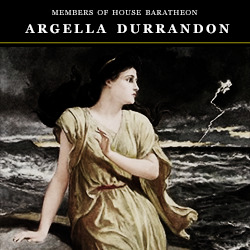
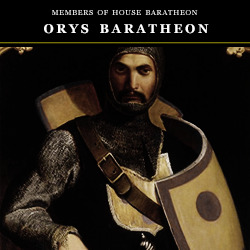
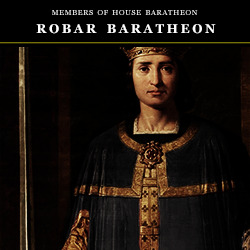
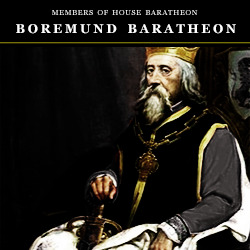
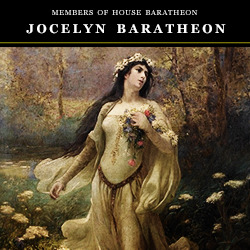
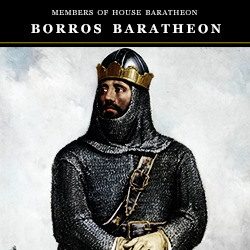
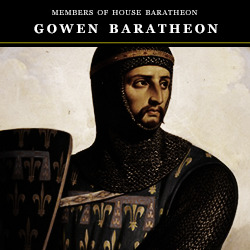
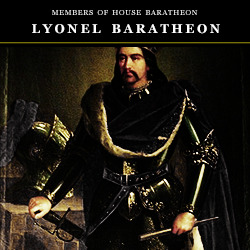
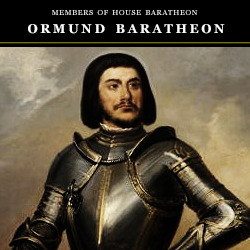
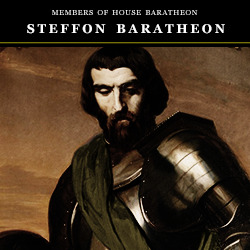
Members of House Baratheon
Argella Durrandon
For a few days it was feared that Storm’s End might suffer the same fate as Harrenhal, for Argilac’s daughter Argella barred her gates at the approach of Orys Baratheon and the Targaryen host, and declared herself the Storm Queen.
Orys Baratheon
The pact would be sealed by the marriage of King Argilac’s daughter to Orys Baratheon, Lord Aegon’s childhood friend and champion. These terms Argilac the Arrogant rejected angrily. Orys Baratheon was a baseborn half brother to Lord Aegon, it was whispered, and the Storm King would not dishonor his daughter by giving her hand to a bastard. The very suggestion enraged him. Argilac had the hands of Aegon’s envoy cut off and returned to him in a box. “These are the only hands your bastard shall have of me,” he wrote.
Robar Baratheon
Lord Orys Baratheon’s grandson, Lord Robar, was the first great lord to openly proclaim for Prince Jaehaerys against his uncle, Maegor the Cruel. For his loyalty and courage, he was named Protector of the Realm and Hand of the King following Maegor’s strange death upon the Iron Throne. During the remainder of King Jaehaerys’s minority, Lord Robar shared the rule of the realm with the king’s mother, the Dowager Queen Alyssa. Half a
Boremund Baratheon
His fame, his reputation, and his wealth did much to support his son Laenor’s claim. Boremund Baratheon also supported Laenor’s claim, as did Lord Ellard Stark.
Jocelyn Baratheon
From their union sprang the Lady Jocelyn, who married the eldest of the Old King’s sons and became mother to the Princess Rhaenys—“ the Queen Who Never Was” as the glib jester Mushroom called her— and Boremund Baratheon, who succeeded his father as Lord of Storm’s End.
Borros Baratheon
Though old Lord Boremund had died, his son Borros was even more belligerent than his father, and the lesser storm lords would surely follow wherever he led. “Then
Gowen Baratheon
Grand Maester Malleon recorded the last mating between stag and lion, some ninety years ago, when Tya Lannister wed Gowen Baratheon, third son of the reigning lord. Their only issue, an unnamed boy described in Malleon’s tome as a large and lusty lad born with a full head of black hair, died in infancy.
Lyonel Baratheon
Lord Lyonel Baratheon of Storm’s End— known as the Laughing Storm and famed for his prowess in battle— was not a man easily appeased when his pride was wounded.
Ormund Baratheon
Lord Ormund Baratheon, the Westerosi commander, was amongst the first to perish. Cut down by the hand of Maelys the Monstrous, he died in the arms of his son and heir, Steffon Baratheon.
Steffon Baratheon
As a boy, Tywin Lannister had served as a royal page at King’s Landing. He and Prince Aerys, together with a younger page, the prince’s cousin Steffon Baratheon of Storm’s End, had become inseparable. During the War of the Ninepenny Kings, the three friends had fought together, Tywin as a new-made knight, Steffon and Prince Aerys as squires.
#house baratheon#house durrandon#asoiafedit#a song of ice and fire#the world of ice and fire#the princess and the queen#artasoiaf series#nanshe's graphics
150 notes
·
View notes